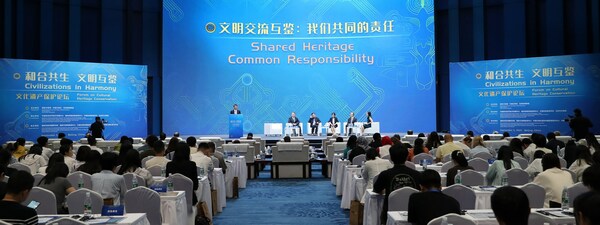By Fang Aiqing and Wang Ru
BEIJING, Sept. 6, 2023 /PRNewswire/ -- The key role of media cooperation in promoting Asian cultural heritage conservation, as well as the importance of amplifying Asia's voice, was emphasized at a forum on Tuesday in Beijing attended by media experts and heritage conservators from various Asian countries.

The Forum on Cultural Heritage Conservation with the theme “Civilizations in Harmony” is held in Beijing on Tuesday. (wang zhuangfei / china daily)
The Forum on Cultural Heritage Conservation, themed "Civilizations in Harmony", was co-organized by China Daily, the National Cultural Heritage Administration and the Asia News Network. It was held following ANN's annual board meeting on Monday.
Li Shulei, a member of the Political Bureau of the Communist Party of China Central Committee and head of the Publicity Department of the CPC Central Committee, said the forum is an important platform to implement the Global Civilization Initiative and promote the inheritance and development of Asian cultures.
He said he hopes that the forum can advance cultural heritage conservation cooperation and deepen exchanges in the field, in order to enhance Asian countries' understanding and recognition of Chinese culture and to promote the shared values of all mankind.
Qu Yingpu, publisher and editor-in-chief of China Daily, highlighted ANN's guiding role in promoting the creative transformation and innovative development of Asian countries' fine traditional cultures, and the urgency to "accelerate the formation of Asia's voice that can match the volume of Asia".
"Taking Asia as the anchor point, we should build a media cooperation network for dialogue between global civilizations, systematically demonstrate the significance of Asian civilizations to the world and spread the shared values therein for all humankind," Qu said.
Li Qun, head of the National Cultural Heritage Administration, said: "We will encompass major subjects such as human origin, global ancient civilizations and the Belt and Road Initiative to make plans for joint archaeological work, and establish sound mechanisms for coordinating joint archaeological efforts."
He called for giving full play to ANN's communication advantages and the resource advantages of the Alliance for Cultural Heritage in Asia, which was inaugurated in April in the presence of more than 150 delegates from 22 Asian countries and three international organizations. The Asian Fund for Cultural Heritage Conservation, which is affiliated with the alliance, has so far generated 88 million yuan ($12 million) for conservation projects.
Mahfuz Anam, chairman of the ANN, emphasized mass media's responsibility to improve mutual understanding of diverse cultures that make for the collective heritage of humankind. He said that global and regional media cooperation in increasing knowledge of each other's cultures can largely help create deeper harmony between different cultural and ethnic groups.
Wang Jinzhan, executive secretary of the China Association for Science and Technology, listed some of the joint efforts made by Chinese and foreign cultural relics conservators to facilitate high-quality conservation with scientific and technological innovations. For example, Chinese scientists assisted in mapping Cambodia's Angkor sites and helped monitor its preservation with 3D scanning and Geographic Information System technologies, he said.
Kong Vireak, secretary-general of the Alliance for Cultural Heritage in Asia and Cambodia's undersecretary of state for culture and fine arts, highlighted the international endeavor to preserve the cultural legacies of Angkor, and the sustainable development of tourism and job opportunities generated through the process.
At a seminar held after the keynote speeches, delegates from cultural heritage institutions, and media agencies and associations, discussed how they can shoulder their responsibility to better preserve cultural heritage.











